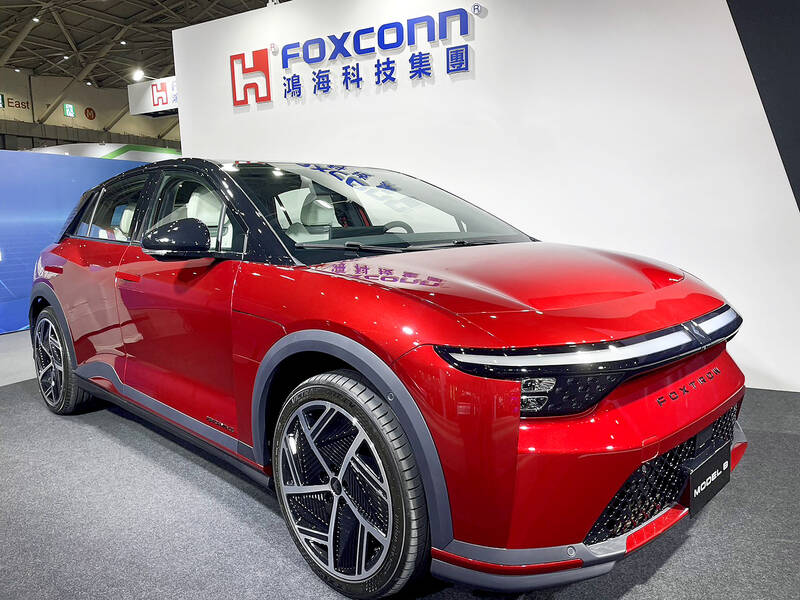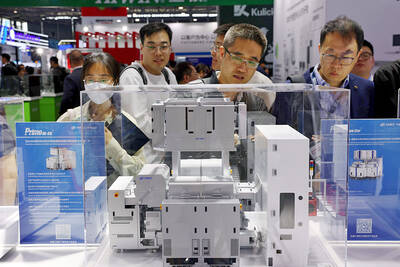Foxtron Vehicle Technologies Co (鴻華先進) on Wednesday announced that its Model B electric vehicle (EV) has received government certification and is scheduled to hit markets in the fourth quarter of this year.
Global EV demand continues to grow, with the EV market in Taiwan, China, Europe and the US expanding, Foxtron spokesman Wang Li-wei (王理巍) told an investors’ conference.
It is estimated that EVs would account for more than 30 percent of global vehicle sales by 2030, he added.

Photo: CNA
Several EV models would be launched in the second half of the year, with the Model B to debut in the fourth quarter, Wang said, adding that it has already obtained the government certification required to start selling.
On the progress of the US version of the Model C prototype, he said that field testing is ongoing in the US, and the development and certification of the model are expected to be completed by the end of this year.
Foxtron, a joint venture between Hon Hai Precision Industry Co (鴻海精密) and Yulon Motor Co (裕隆汽車), is also working with Japan’s Mitsubishi Motors Corp to develop a right-hand-drive version, targeting the New Zealand and Australian markets in the second half of next year, he said.
As for Foxtron’s EV strategy this year, Wang said that the company would continue with deliveries of existing models, ramp up production of new models and maintain its strong research-and-development investments.
Foxtron noted that in just a few years, it has developed the Model B, C, D and E platforms, which collectively cover nearly all EV size segments.
The Taiwanese version of the Model C has already been launched and a long-range version was also rolled out at the end of last year.
In terms of commercial EVs, Wang said that in addition to the Model T large electric bus, the company has also launched the Model U mid-sized electric bus.
Having secured a spot in Taiwan’s national e-bus program, Foxtron expects significant growth in orders this year, he added.

With this year’s Semicon Taiwan trade show set to kick off on Wednesday, market attention has turned to the mass production of advanced packaging technologies and capacity expansion in Taiwan and the US. With traditional scaling reaching physical limits, heterogeneous integration and packaging technologies have emerged as key solutions. Surging demand for artificial intelligence (AI), high-performance computing (HPC) and high-bandwidth memory (HBM) chips has put technologies such as chip-on-wafer-on-substrate (CoWoS), integrated fan-out (InFO), system on integrated chips (SoIC), 3D IC and fan-out panel-level packaging (FOPLP) at the center of semiconductor innovation, making them a major focus at this year’s trade show, according

DEBUT: The trade show is to feature 17 national pavilions, a new high for the event, including from Canada, Costa Rica, Lithuania, Sweden and Vietnam for the first time The Semicon Taiwan trade show, which opens on Wednesday, is expected to see a new high in the number of exhibitors and visitors from around the world, said its organizer, SEMI, which has described the annual event as the “Olympics of the semiconductor industry.” SEMI, which represents companies in the electronics manufacturing and design supply chain, and touts the annual exhibition as the most influential semiconductor trade show in the world, said more than 1,200 enterprises from 56 countries are to showcase their innovations across more than 4,100 booths, and that the event could attract 100,000 visitors. This year’s event features 17

Germany is to establish its first-ever national pavilion at Semicon Taiwan, which starts tomorrow in Taipei, as the country looks to raise its profile and deepen semiconductor ties with Taiwan as global chip demand accelerates. Martin Mayer, a semiconductor investment expert at Germany Trade & Invest (GTAI), Germany’s international economic promotion agency, said before leaving for Taiwan that the nation is a crucial partner in developing Germany’s semiconductor ecosystem. Germany’s debut at the international semiconductor exhibition in Taipei aims to “show presence” and signal its commitment to semiconductors, while building trust with Taiwanese companies, government and industry associations, he said. “The best outcome

Semiconductor equipment billings in Taiwan are expected to double this year, as manufacturers in the industry are keen to expand production to meet strong global demand for artificial intelligence applications, according to SEMI, which represents companies in the electronics manufacturing and design supply chain. Speaking at a news conference before the opening of Semicon Taiwan trade show tomorrow, SEMI director of industry research and statistics Clark Tseng (曾瑞榆) said semiconductor equipment billings in Taiwan are expected to grow by an annual 100 percent this year, beating an earlier estimate of 70 percent growth. He said that Taiwan received a boost from a